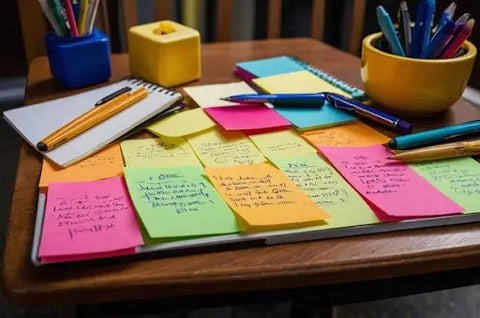1. Understanding the Importance of Strong Study Habits

Strong study habits are essential for academic success and overall well-being. Let’s explore why consistent study habits can make a big difference and how they benefit students in the long run.
Consistent Study Habits Lead to Better Academic Performance:
- Improved Performance: Regular study routines make it easier to remember and understand what you learn. When students study consistently, they’re more likely to keep information and perform better on tests and assignments.
- Reduced Stress: By breaking study sessions into manageable chunks and sticking to a schedule, students can avoid last-minute cramming. This organized approach reduces anxiety and helps students feel more prepared and confident during exams.
Long-Term Benefits of Developing Strong Study Habits:
- Better Time Management: Good study habits teach students how to allocate their time effectively. By setting specific goals and prioritizing tasks, students learn to balance their studies with other activities, leading to more productive use of their time.
- Enhanced Self-Discipline: Regular study routines help build self-discipline, which is important for handling tasks in and out of school. Students who practice good study habits develop a strong work ethic and are better prepared to face challenges
2. Setting Clear and Achievable Study Goals

Setting clear and achievable study goals is a crucial part of effective study habits. Here’s why having specific goals is important and how you can set and track them for better academic success.
The Importance of Setting Specific, Measurable, and Realistic Goals:
- Specific Goals: Clear goals help students focus their efforts. Instead of a vague aim like “study math,” a specific goal such as “complete chapter 3 exercises” provides direction and clarity.
- Measurable Goals: Goals should have measurable outcomes so students can track their progress. For example, setting a goal to “review 20 vocabulary words” is measurable and allows students to see exactly what has been accomplished.
- Realistic Goals: Setting goals you can achieve within a certain time helps keep you motivated. Goals that are too hard can make you frustrated, but realistic ones help you make steady progress and build confidence.
Examples of Short-Term and Long-Term Study Goals:
- Short-Term Goals:
- Finish a specific assignment or homework problem set by the end of the day.
- Read and summarize one chapter from a textbook by the end of the week.
- Long-Term Goals:
- Prepare and review all material for an upcoming exam over the next month.
- Master a new concept or skill by the end of the semester.
Tracking Progress Effectively:
- Use a Study Planner: Keep a study planner or digital calendar to record goals and deadlines. This helps visualize what needs to be done and when.
- Create a Checklist: Break down larger goals into smaller tasks and check them off as they are completed. This provides a sense of accomplishment and keeps students on track.
- Regular Reviews: Set aside time each week to review progress. Reflect on what’s been achieved and adjust goals as needed based on performance and upcoming deadlines.
3. Creating a Structured Study Schedule

A structured study schedule is essential for effective learning and academic success. Here’s how to create a routine that fits seamlessly into your daily life and strategies to prioritize your study tasks effectively.
The Need for a Regular Study Routine:
- Consistency: Establishing a regular study routine helps build a habit, making it easier to stick with your study plans. Consistent study times ensure that you dedicate specific periods each day to focus on academic work without last-minute cramming.
- Integration with Daily Schedule: Find study times that fit well with your existing commitments. Whether it's early in the morning, after school, or before bed, choose times when you’re most alert and focused. Integrating study sessions into your daily routine makes it easier to maintain balance and reduces stress.
Strategies for Prioritizing Subjects and Topics:
- Assess Difficulty and Importance: Start by evaluating which subjects or topics are most challenging or have upcoming exams and deadlines. Prioritize these areas in your study schedule to ensure you allocate enough time to tackle them effectively.
- Create a Study Plan:
- Daily Plan: Break your study time into manageable chunks and assign specific subjects or tasks to each session. For example, you might study math for 30 minutes and then switch to science for another 30 minutes.
- Weekly Plan: Outline a weekly schedule that includes study sessions for each subject. Adjust based on upcoming tests, assignments, and areas needing more attention.
- Use a Study Calendar: A visual calendar or planner helps keep track of your study sessions and deadlines. Mark important dates like test days and project due dates to remind yourself of what needs immediate attention.
- Incorporate Breaks: Avoid burnout by scheduling regular breaks during study sessions. Short breaks can help maintain focus and improve productivity.
4. Designing a Productive Study Environment

Creating a productive study environment is crucial for maximizing focus and efficiency. Here’s how to set up a study space that minimizes distractions and enhances your ability to concentrate.
Key Elements of a Distraction-Free Study Space:
- Lighting: Choose a well-lit area to prevent eye strain and maintain alertness. Natural light is ideal, but if that’s not possible, ensure you have a good desk lamp with adjustable brightness to keep your study space well-lit.
- Noise Levels: Aim for a quiet environment to help you concentrate. If you can't get rid of noise, try using noise-canceling headphones or playing soft background music to help block out distractions.
- Organization: Keep your study area tidy and free of clutter. Use organizers, shelves organizer, and drawers to store supplies and materials neatly. An organized space helps reduce stress and makes it easier to find what you need quickly.
Tips for Minimizing Distractions:
- Turn Off Notifications: Silence your phone or use “Do Not Disturb” mode to prevent interruptions from texts, calls, and app notifications during study sessions.
- Use Productivity Apps: Consider using apps designed to block distracting websites and notifications. Tools like Focus@Will, Forest, or Freedom can help you stay focused by limiting access to potential distractions.
- Set Clear Boundaries: Inform family members or housemates of your study times to minimize interruptions. Establishing boundaries helps create a dedicated study period where you can focus solely on your work.
5. Incorporating Active Study Techniques

Active study techniques are essential for deeper understanding and retention of information. Unlike passive reading, active learning engages your brain more effectively, helping you grasp and remember material better. Here’s how you can incorporate these techniques into your study routine:
Importance of Active Learning Strategies:
- Summarizing: After reading a section of material, summarize it in your own words. This technique helps reinforce what you’ve learned by forcing you to process and rephrase the information, which aids in retention.
- Questioning: Challenge yourself with questions about the material. Ask “Why?” and “How?” to explore concepts more deeply. Creating and answering questions improves your comprehension and identifies areas that need further review.
- Teaching Others: Explain the material to someone else, like a classmate or even a family member. Teaching forces you to organize your thoughts clearly and identify any gaps in your understanding.
Effective Study Techniques:
- Flashcards: Use flashcards to test yourself on key terms, dates, or concepts. Write a question on one side and the answer on the other. Flashcards are great for quick reviews and can help reinforce memorization.
- Mind Maps: Create mind maps to visually organize information. Start with a central concept and branch out with related ideas and details. This technique helps you see connections between concepts and enhances your ability to recall information.
- Practice Quizzes: Regularly take practice quizzes to assess your knowledge and prepare for exams. These quizzes help you get used to the format and identify areas where you need more practice.
6. Balancing Study Sessions with Breaks

Maintaining a balanced study routine is crucial for both productivity and well-being. Regular breaks not only help you stay focused but also prevent burnout and improve overall study effectiveness. Here’s how to effectively incorporate breaks into your study sessions:
Significance of Taking Regular Breaks:
- Maintain Focus: Studying for long periods without breaks can lead to diminishing returns. Taking regular breaks helps you stay focused and avoid getting too tired, so you can keep working well during your study sessions.
- Prevent Burnout: Extended study periods without breaks can lead to burnout and increased stress. Breaks provide a necessary respite, helping you return to your studies feeling refreshed and more motivated.
Techniques and Recommended Break Activities:
- Pomodoro Method: This popular technique involves studying for 25 minutes followed by a 5-minute break. After four cycles, take a longer break of 15-30 minutes. The Pomodoro method helps keep you focused while ensuring you take regular, structured breaks.
- Ideal Break Activities: During your breaks, engage in activities that help you relax and recharge. Consider activities like stretching, taking a walk, or practicing deep breathing exercises. These activities can help clear your mind and reduce stress, making you more productive when you return to studying.
7. Utilizing Study Resources and Tools

Good study habits are helped by using the right tools, which can make learning easier and studying more efficient. Here’s a guide to various study aids and how to choose the best ones for your needs:
Introduction to Study Aids:
- Textbooks: Traditional textbooks provide comprehensive coverage of subject material. They are especially useful for understanding core concepts and detailed explanations. Look for textbooks that are recommended by teachers or have positive reviews.
- Online Resources: Websites, educational videos, and online articles offer a wealth of information and can be a great supplement to textbooks. Platforms like Khan Academy, Coursera, and educational YouTube channels provide interactive content that can help clarify complex topics.
- Study Apps: Apps like Quizlet, Anki, and Duolingo offer interactive ways to study through flashcards, quizzes, and practice exercises. These tools can be particularly helpful for memorizing facts, practicing vocabulary, and testing your knowledge.
Choosing the Right Resources:
- For Different Subjects: Select resources that align with the specific requirements of each subject. For instance, if you’re studying math, look for problem-solving apps and online tutorials. For literature, use discussion forums and e-books to explore different perspectives.
- For Different Learning Styles: Identify your learning style to choose the most effective resources. Visual learners might benefit from video tutorials and diagrams, while auditory learners might prefer podcasts and recorded lectures. Kinesthetic learners, who learn best through hands-on activities, might find interactive apps and practice exercises most useful.
8. Reviewing and Reflecting on Your Study Habits

To continually improve your academic performance, it's essential to regularly review and reflect on your study habits. This process helps you identify what's working well and what might need adjustment. Here’s how to effectively assess and refine your study routines:
Encourage Regular Self-Assessment:
- Track Your Progress: Keep a record of your study sessions and results from quizzes, tests, or assignments. Noting areas where you excel and where you struggle can provide valuable insights into your study effectiveness.
- Self-Evaluation: Regularly evaluate your study habits by asking yourself questions like: Are my study sessions productive? Am I retaining the information well? Do I feel prepared for exams? This self-assessment will help you pinpoint any issues and understand where improvements are needed.
Strategies for Adjusting Study Habits:
- Analyze Test Results: Review your test results to identify patterns in your performance. If you find that you consistently struggle with specific types of questions or topics, adjust your study focus to address these areas.
- Seek Feedback: If possible, get feedback from teachers or tutors on your study techniques and areas for improvement. They can offer suggestions and resources to help you improve.
- Reflect on Your Routine: Take time to reflect on your study routine and make adjustments based on your experiences. For example, if you find that you’re frequently distracted during study sessions, you might need to create a more distraction-free environment or adjust your study schedule.
- Adapt and Experiment: Be willing to try new study methods or tools if your current ones aren’t yielding the desired results. Experimenting with different techniques, like active learning strategies or various study resources, can help you find what works best for you.
9. Staying Motivated and Overcoming Study Challenges

Maintaining motivation and overcoming obstacles are crucial for effective studying and academic success. Here’s how to stay on track and tackle common study challenges:
Tips for Maintaining Motivation:
- Set Clear Rewards: Create a system of rewards for meeting your study goals. For example, treat yourself to a favorite snack, a short break, or some leisure time after completing a study session or achieving a milestone. This can help keep you motivated and give you something to look forward to.
- Visualize Your Goals: Keep your long-term academic goals in mind. Visualizing your future success can inspire you to stay focused and push through difficult study sessions.
- Break Down Goals: Divide larger study goals into smaller, manageable tasks. Completing these smaller tasks provides a sense of accomplishment and helps maintain momentum.
- Stay Positive: Surround yourself with positive affirmations and remind yourself of your progress and achievements. Positive reinforcement can boost your confidence and motivation.
Common Challenges and Solutions:
- Procrastination:
- Break Tasks into Smaller Steps: Large tasks can seem overwhelming, leading to procrastination. Break them down into smaller, manageable parts and tackle them one at a time.
- Use the Pomodoro Technique: Work in focused intervals (e.g., 25 minutes) followed by short breaks. This method can make starting tasks less daunting and improve productivity.
- Set Deadlines: Create deadlines for each study task and stick to them. Deadlines can provide a sense of urgency and help combat procrastination.
- Lack of Focus:
- Eliminate Distractions: Identify and remove potential distractions from your study environment. Turn off notifications on your devices and choose a quiet, dedicated study space.
- Create a Study Routine: Establish a regular study schedule to build consistency and make studying a habit. A structured routine can help improve focus and reduce procrastination.
- Practice Mindfulness: Techniques like deep breathing or short meditation sessions can help improve concentration and reduce stress, making it easier to stay focused.
- Feeling Overwhelmed:
- Prioritize Tasks: Identify which tasks are most urgent or important and tackle them first. Prioritizing can help manage the feeling of being overwhelmed.
- Seek Support: If you're struggling with a particular subject or study challenge, consider seeking help from teachers, tutors, or study groups. Support from others can provide new perspectives and solutions.
10. The Role of Healthy Lifestyle Choices in Study Success

Maintaining a healthy lifestyle is essential for academic success. Good study habits alone aren't enough; what you do outside of study time can significantly impact your performance. Here’s how a healthy lifestyle supports effective studying and tips for integrating these habits into your daily routine:
Connection Between Healthy Lifestyle and Effective Studying:
- Adequate Sleep:
- Cognitive Function: Quality sleep enhances memory retention, concentration, and problem-solving skills. During sleep, your brain consolidates new information and processes what you've learned, which is crucial for effective studying.
- Emotional Well-being: Enough sleep helps regulate emotions, reducing stress and anxiety that can interfere with your ability to focus and learn.
- Nutrition:
- Brain Function: A balanced diet provides essential nutrients that support brain health. Foods rich in omega-3 fatty acids, antioxidants, and vitamins contribute to improved cognitive function and memory.
- Energy Levels: Proper nutrition ensures you have the energy needed for both studying and daily activities. Avoiding excessive sugar and caffeine can help maintain stable energy levels and prevent crashes that can affect focus and productivity.
- Exercise:
- Mental Clarity: Regular physical activity increases blood flow to the brain, enhancing cognitive abilities and concentration. Exercise also promotes better sleep and reduces stress levels.
- Stress Reduction: Engaging in physical activities like walking, jogging, or yoga can lower stress hormones and improve mood, making it easier to handle academic pressures.
Incorporating Healthy Habits into Your Daily Routine:
- Establish a Sleep Routine:
- Aim for 7-9 hours of quality sleep each night. Set a consistent bedtime and wake-up time, and create a relaxing bedtime routine to signal to your body that it's time to wind down.
- Limit screen time before bed to avoid disrupting your sleep cycle. Consider reading a book or practicing relaxation techniques instead.
- Maintain a Balanced Diet:
- Include a variety of fruits, vegetables, whole grains, and lean proteins in your meals. Plan snacks like nuts, yogurt, or fruit to keep your energy levels steady throughout the day.
- Stay hydrated by drinking plenty of water. Dehydration can negatively impact concentration and overall cognitive function.
- Incorporate Regular Exercise:
- Schedule at least 30 minutes of moderate exercise most days of the week. This could be a brisk walk, a workout session, or even a sport you enjoy.
- Use exercise as a break during study sessions to refresh your mind. Short, physical activities can help reset your focus and improve productivity.
11. Building a Support System for Your Study Journey

Building a strong support system can significantly enhance your study efforts and academic success. Having the right support from teachers, peers, and family members can make studying more effective and less stressful. Here’s how to build and utilize your support network:
Importance of Seeking Support:
- Teachers:
- Clarify Doubts: Teachers can provide valuable insights and explanations on challenging topics. Don’t hesitate to ask questions or seek extra help when needed.
- Guidance and Feedback: Teachers can offer feedback on your progress and suggest ways to improve your study techniques and understanding of the material.
- Peers:
- Shared Knowledge: Studying with classmates can provide different perspectives on the subject matter. Peers can help clarify concepts and fill in gaps in your understanding.
- Motivation and Accountability: Having a study partner or group can keep you motivated and accountable. Regular study sessions with friends can make learning more engaging and less isolating.
- Family Members:
- Encouragement: Family members can offer emotional support and encouragement, which is crucial for maintaining motivation and managing stress.
- Study Environment: Family can help create a conducive study environment by minimizing distractions and providing a quiet, dedicated space for studying.
Creating or Joining Study Groups:
- Forming Study Groups:
- Find Like-minded Peers: Look for classmates or friends who share similar academic goals and interests. Establish a regular schedule for group study sessions.
- Set Clear Objectives: Agree on the topics to cover, goals for each session, and roles for each member to ensure productive meetings.
- Joining Existing Study Groups:
- School Resources: Check if your school offers study groups or tutoring sessions. Many schools have organized study groups for different subjects or grade levels.
- Online Communities: Join online study groups or forums related to your subjects. These platforms can offer additional resources and support from students around the world.
Benefits of Collaborative Learning:
- Enhanced Understanding: Working with others can help you grasp difficult concepts more thoroughly. Group discussions and collaborative problem-solving can deepen your comprehension.
- Diverse Perspectives: Different viewpoints can offer new ways of thinking about a topic, which can enhance your critical thinking and problem-solving skills.
- Increased Engagement: Collaborative learning can make studying more interactive and enjoyable, reducing the monotony of solo study sessions.
Conclusion
Developing strong study habits is a journey that requires time and persistence. Stay consistent, maintain a positive attitude, and be adaptable to find what works best for you. Your commitment to improving your study habits will lead to greater academic success, reduced stress, and a more balanced approach to your studies. Keep moving forward and believe in your ability to achieve your goals.
Need some school supplies? Browse our collection of back-to-school essentials to find everything you need for a successful year ahead.


















